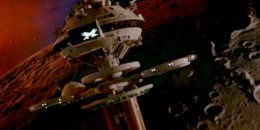Regula Class: Difference between revisions
More actions
No edit summary |
No edit summary |
||
| (2 intermediate revisions by the same user not shown) | |||
| Line 1: | Line 1: | ||
{{BaseClass | {{BaseClass | ||
|color= Federation | |color= Federation | ||
|image= [[File:Regula12.jpg| | |image= [[File:Regula12.jpg|260px]] | ||
|name=''Regula''-class | |name=''Regula''-class | ||
|service=2279 | |service=2279 | ||
| Line 82: | Line 82: | ||
|sensorrange=20 lightyears | |sensorrange=20 lightyears | ||
|comms=25 lightyears | |comms=25 lightyears | ||
|other=* | |other=* Equipped with four large tanks that store gasses and or liquids under high pressure. | ||
}} | }} | ||
| Line 183: | Line 183: | ||
*Pressure tank connection hard points | *Pressure tank connection hard points | ||
|} | |} | ||
{{FooterShip}} | |||
{{CreditsBF}} | {{CreditsBF}} | ||
Latest revision as of 13:29, 17 November 2024
Class Description
While Starfleet was celebrating the completion, they were also preplexed with another problem. While the new Spacedocks would be built in secure, high traffic areas of the Federation, other sectors needed starbases as well. These sectors didn't need a massive Space Dock, and most didn't have a Class-M planet for a planet side base either. In 2279, the first of the Regula Class of Starbases was built in Mutara Sector. This gave Starfleet a new, small type of Science and support base.
The Regula series of stations were designed as small, flexible platforms for long-duration scientific missions in isolated locations. These kinds of missions could last for years, keeping a science team on station for that length of time would require the commitment of either a major starship asset or a fleet of small science vessels relieving one another every few months. Either of these was a significant draw on resources, while a small fixed station would offer the same capability at a fraction of the resources.
The stations were designed to be as simple and quick to build as possible, while offering the maximum flexibility in equipment. The Regula 1 station incorporated a 30 meter diameter dome capable of holding a large system such as an optical telescope, while the interior spaces included Geoplastics and Thermonics labs and a small particle accelerator ring.

The stations had very little armament, the shields were included largely to screen the station from naturally occurring background radiation during sensitive experiments, while small phasers were included to provide defence against larger meteors and to deter raiders.
The most notable of the Regula stations was the first, Regula 1. The Genesis Project created by Dr. Carol Marcus had profound political and military implications, by housing it in a remote outpost the Federation hoped to assist in maintaining the secrecy around Genesis. Stage two of the Genesis project required a large and completely lifeless underground location in an isolated spot.
Unfortunately, the isolation of Regula also proved to be a major drawback when the project was hijacked by Khan and the stolen USS Reliant. The only vessel nearby was the USS Enterprise, on a training mission with a largely cadet crew. The Enterprise was eventually forced to cripple the Reliant, provoking Khan to detonate the Genesis device inside the Mutara nebula which destroyed the Regula station.
The Regula stations provided valuable service for many years, but they have now being retired in favor of newer and larger Starbases. Today, there are only twelve the Regula Type 1 Starbases in operation within the Federation. These include the original SB26 and SB49.
Starbase Specifications
| Specifications | |||
|---|---|---|---|
| Basic Information |
|
Crew Complement |
|
| Station Keeping / Other Propulsion Systems |
|
Offensive Systems |
ENERGY WEAPONS TORPEDO LAUNCHERS
PAYLOAD
|
| Defensive Systems |
|
Primary Systems |
Power Generators:
|
| Docking & Auxiliary Craft |
DOCKING PORTS: 8
|
Other Notes |
CREW AMENITIES:
STARBASE FEATURES:
|
Deck Listing
Port Hull
| Deck/Deck Range | Details/Specifications of Deck |
|---|---|
| Deck 1 |
|
| Deck 2 |
|
| Deck 3 |
|
| Deck 4 |
|
| Deck 5 |
|
| Deck 6 |
|
| Deck 7 |
|
| Deck 8 |
|
| Deck 9 |
|
| Deck 10 |
|
| Deck 11 |
|
| Deck 12 |
|
| Deck 13 |
|
| Deck 14 |
|
| Deck 15 |
|
| Deck 16 |
|
| Federation Ship & Station Classes | |
|---|---|
| Starships | • Akira Class • Antares Class • Century Class • Defiant Class • Galaxy Class • Insignia Class • Luna Class • Nebula Class • Nova Class • Prometheus Class • Saber Class • Steamrunner Class • Sovereign Class • Vesta Class • |
| Starbases | • Argus Class • Aurora Class • Regula Class • Sigma Class • Spacedock Class • |
| Support Craft | Shuttles • Type 8 Shuttle • Type 9 Shuttle • Type 11 Shuttle • Type 15 Shuttlepod • Runabouts • Argo Class • Danube Class • Fighters • Gryphon Class • Other • Workbee • |
Use of Bravo Fleet's Regula Class is used under the Creative Commons 4.0 License and may have been modified for AioRPG.

